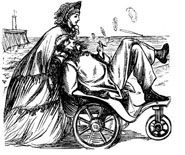
The First & the Last
HARVARD DIARY
It’s an old and not uncommon story — the smart, well-educated person who is morally dumb. Hitler and Stalin had no trouble recruiting an assortment of prominent intellectuals to their cause, as well as all sorts of professional men — doctors, lawyers, professors and school teachers, even clergy. Still, many of us who have staked everything, it seems, on the grades we get in various schools, colleges, or postgraduate programs have little reason to undermine our own authority (in our own eyes, never mind those of others) by reminding ourselves too insistently how compatible a high academic record can be with smugness, hypocrisy, even collusion with out-and-out (political, sociabpevil.
When I was living in Louisiana in the early 1960s, getting to know the black children who initiated school desegregation there, I also spent a lot of time with their parents and grandparents — the latter, in certain homes, very important figures indeed. In one such home I got to know a late middle-aged, courtly man who had worked for many years in a well-known Garden District home, then as a black assistant to the white waiters in a New Orleans club frequented by businessmen, lawyers, doctors, professors, architects, “all the fine people doing all the fine work,” as that man (then 55) told me. Once, proudly, he let me know this: “They all been to college,” then he added, “a lot of them went beyond.” I seemed a bit puzzled, so he explained to me that many of those men had gone to professional schools, and were, thereby, “as educated as you can get.” His respect for such folk — even his awe of them — was evident: “The tops of the white people, that’s who they are.”
He had occasion to listen to such leading individuals speak, to observe how they behaved with one another. Often he was enormously impressed by the conversation he overheard: talk of deals, huge deals, deals entailing millions and millions of dollars; talk of breakthroughs in research, of grants elicited from foundations or individuals, of the ranking of this or that school; talk of cases won or lost in courts, of cases healed, cured in hospitals, clinics; talk of political victories, expected and unexpected; talk of children admitted to schools hither and yon, of children’s plans to go here, there, everywhere; talk of the past, of places seen, people met, of memories that linger; and talk of the future, of what is expected or assumed, or sometimes feared. All of that stuck with him, crossed his mind, in bits and pieces, as he went about his work, but also as he lived his personal life in a neighborhood not far distant, as the crow flies, but an obvious ocean away, as he knew, and knew to say in his ever tactful manner: “I had to smile when I heard the President [Kennedy] say we’re going to get to the moon one of these days soon — I thought, I’ve got a better chance of getting up there than I do of living where these folks I wait on live, or getting in the club where I work, other than to do what I do. I could even get one of those high degrees some of them have; I could have lots of big ones [50 or 100 dollar bills, say] in my pocket, and it’d all mean nothing.”
That word “nothing” stopped him cold. He seemed to be musing on it, hence a prolonged silence, which prompted in me a search for a subject matter to put into words. But his evident seriousness discouraged my interest in light talk, and so I sat there, waiting. Eventually, a smile on his face, he had more to say: “I hear so much because those folks don’t think I’m anyone; they think I’m no one — so it don’t make one iota of difference, if my ears pick up the words coming out of their mouths! Someone who’s nothing can hear anything; that’s what my momma told me when I got my job, and I told her all I was learning, filling up glasses with ice water and making sure if someone slipped a match book in his pocket, I was there with another one — and she sure knew the score! I’ll be standing there, close as can be to them — it’s usually two who come and eat together; and one will call the other ‘my luncheon friend,’ that’s what I’ve heard; and they’ll lean forward, as though it’s a big secret, but they don’t lower their voices, because it’s only me that’s within distance of hearing, and I sure enough don’t count. ‘You make Mr. Charlie think you count, and you’re going to drop from zero to way below zero’ — my uncle Fred and his advice to us kids growing up!
You May Also Enjoy
An enormous irony shadows us throughout life: our capacity, our willingness even, to talk one line and live another — like the policeman caught stealing, the lawyer who breaks the law.
The proud and talented scholar threw herself gladly, ecstatically at His feet, He of the Cross, He whose Cross had become her cross.
The spiritual life of children is well worth comprehending on its own merits, with its own dignity and significance, rather than as an expression of something else.

